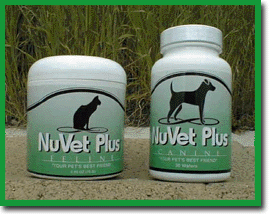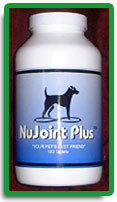QuestionQUESTION: This year and last starting in late Aug. my chiuhuahua starts itching like crazy. He does not have fleas or mites and I believe he's reacting to some local plant. He's eight pounds and low to the ground so his belly rubs on most all of the plant life we encounter. What can I do to help relieve his itching? Last year I took him to the vet and she prescribed something that didn't work very well, much of which was left over and I've tried it again to no avail. I'm not going back to the vet this year as I feel they were of no help only I have to pay $100 a pop just to take him in. Is there a salve or something I can try for allergies? He only has this problem in late Aug. thru mid-Sept. It's hard to watch him try and relieve the itch when he can't.
ANSWER: Since I have written books about this subject, it is much too involved to explain it all here, but suffice it to say that the first step to solving your problem, even though it appears to be seasonal because of the "priming factor", is to change your dog's diet. Remove ALL wheat, corn, soy dairy and beef, as well as any by-products, chemicals, and gluten. By diet, I am including ANYTHING that goes into his mouth including snacks, supplements, medications, etc.
Also, remove ALL chemicals from ON the dog and in the environment. In other words, go totally natural.
In brief, the "priming factor" is about the fact that most people or animals are not sensitive enough to any one thing to cause an overt skin reaction. Allergens will stack on top of one another until, as with priming a pump, they reach a point that the system cannot remove them through the normal wast elimination process, and in order to save the vital organs from too much toxic stress, the body sends the toxins to the largest wast organ, the furthest away from the vital organs, the skin. The medication the vet gives you, generally a steroid, shuts off this process and forces the toxins to remain in the vital organs which eventually will cause organ failure, but puts a lot more money in the vet's pocket.
In order to help stop this from happening, since we can't control the humidity (which has an effect), plants, etc. we remove the things that we CAN control; food,and all internal and external chemicals. Over the years, I have found that this will generally eliminate the problem because it drops the priming factor to a level that the body can handle.
By plugging in a hypo-allergenic food that supports a healthy immune system,and using totally natural flea control, heart worm prevention,etc.; we have routinely eliminated allergy symptoms without additional medication or supplementation. This not only saves the dog from years of suffering, but saves your pocketbook from all future vet expense (that will buy a lot of good dog food).
If you will go to my web site, www.critteroil.com, you will find many articles that I have written on the subject, as well as Critter Oil which will help topically and environmentally with the itching and external chemical issues. I am also available by phone at my shop: 727-327-2356 to answer any questions.
I have been successfully solving this problem for over 20 years with these simple steps. As a matter of fact, I am currently finishing up a new book called "Simple Steps to a Healthy Pet" which I hope to have available by the holidays if not before.
Do these things first, then if we need to we can go into the natural remedies available. Why spend money on supplements when you have to feed your dog anyway? I've always been about saving the client money as well as creating a healthy dog. I guess that's why I drive a 1993 Geo Metro with 187,000+ miles on it. What kind of car does your vet drive? Enough said.
Sue
PS: Also stop vaccinating!
---------- FOLLOW-UP ----------
QUESTION: You stay stop vaccinating; what about rabies shots? My dog is an indoor dog for the most part but we do go for walks in wild areas. I also think there are local laws regarding this. We live in Minnesota.
AnswerFind out if your vet will sign off with a titer test instead of vaccinating. The rabies vaccine will titer for at least ten years. Many areas are now requiring a vaccination only every 3 or 5 years. Find out about your area. There are also homeopathic Nosodes for all of the vaccines if there is a holistic vet in your area that will work with you. If your area only requires a 3-5 year vaccination policy and your vet tells you that he only uses a 1 year vaccine, find another vet.
All 27 vet schools are now warning against annual vaccines. They provide absolutely no additional protection and an abundance of very deadly disease side effects. Your vet is actually aware of this. Some vets just choose to ignore it.

 OVERWEIGHT TOY POODLE
Question
xmas
One of my toy poodles is overweight
OVERWEIGHT TOY POODLE
Question
xmas
One of my toy poodles is overweight
 Flakey dry itchy pink skin ; Nuvet for allergies; Nuvet makes a powder;
QuestionI read where another Shih Tzu owner was having
Flakey dry itchy pink skin ; Nuvet for allergies; Nuvet makes a powder;
QuestionI read where another Shih Tzu owner was having
 bull dog head shakes / NuVET and Vitamin E may help....
Questionjade
QUESTION: my 3 year old femal
bull dog head shakes / NuVET and Vitamin E may help....
Questionjade
QUESTION: my 3 year old femal
 Dog limping try aspirin and NuJoint Plus;
QuestionMy dog is limping and i believe it is because h
Dog limping try aspirin and NuJoint Plus;
QuestionMy dog is limping and i believe it is because h
 Nu Vet Vitamins ; NuVET tabs for Poms ;
QuestionQUESTION: I have a Pom female that has allergic
Nu Vet Vitamins ; NuVET tabs for Poms ;
QuestionQUESTION: I have a Pom female that has allergic